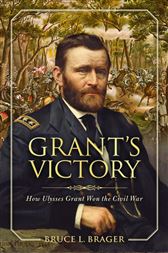
Historians use various devices to tell their story. Some will employ first-hand accounts, others will write nothing but the facts, and still others wrap history around moral lessons for building character. Bruce L. Brager has an engaging style he used to draft his book, Grant’s Victory (Stackpole Books, 2020).
 Ulysses S. Grant was the primary reason why the North won the American Civil War. Whether it was Vicksburg, Chattanooga, or Appomattox Courthouse; Grant was the success story for the Union army. The final chapter of this conflict would be radically different without his presence.
Ulysses S. Grant was the primary reason why the North won the American Civil War. Whether it was Vicksburg, Chattanooga, or Appomattox Courthouse; Grant was the success story for the Union army. The final chapter of this conflict would be radically different without his presence.
The Buildup
Brager explains the course of the war as events unfolded. Union success followed West to East progress. Victories were won at Shiloh and Vicksburg, and the Confederates were eventually driven out of Tennessee and Kentucky. The success in the West, however, was balanced by routine setbacks in the East.
The Army of the Potomac was an enormous fighting locomotive driven by inept engineers. The author describes the inadequacies of the commanders who seem to be only looking for ways to  avert defeat.
avert defeat.
Opportunities for victory were lost because of over-caution. Weak intelligence reports were the problem. Allan Pinkerton’s estimates of Confederate strengths were severely inflated, and the inaccurate figures caused George McClellan to delay engagement until even more reinforcements arrived. These delays gave Robert E. Lee and the Army of Northern Virginia the time to prepare and execute successful attacks.
The author traces a story of incompetence that led up to Grant’s appointment as Commander in Chief. Grant was ultimately selected for the head position because there was no legitimate rival to him. The man from Ohio was a proven winner and was able to do almost the impossible. The duels he fought with Robert E. Lee during the Overland Campaign was perhaps the best military history of America in the 19th century. The two best generals of the opposing armies fought each other, and, sometimes, the battles ended in a draw. Grant was able to use the superior manpower of the Army of the Potomac in ways that earlier Union commanders did not. That is the real secret to his success in the East.
The two best generals of the opposing armies fought each other, and, sometimes, the battles ended in a draw. Grant was able to use the superior manpower of the Army of the Potomac in ways that earlier Union commanders did not. That is the real secret to his success in the East.
A Puzzling Literary Style
The book is well written with an excellent choice of words and the sense of explaining what was important. Intriguingly, Grant himself does not appear in the text until two-thirds of the way through the book. This is a little bit different because authors would ordinarily have the main character interspersed throughout the narrative. Brager does not do this.
He explains his method of writing the book in the final chapter.
What the author does is employ several literary styles to tell the story and point out significant issues. Brager argues that even though the Union was winning in the West, if the East was lost, the war might’ve been over, and the Confederates would have won. He points to the Battle of the Wilderness as an example of Grant only fighting to a draw, but still focusing on moving south and forcing Lee to react instead of attack. Perhaps some of Grant’s genius was appreciating the whole picture and not just the significance of one skirmish or battle.
Grant’s Victory is not a long and ponderous volume. It is under 200 pages and just the type of book you want to have on a Civil War vacation. You can quickly go through the chapters, absorbing the story of decisive battles fought in the East, and finish the book by the time your vacation is over. Brager’s account of the Battle of the Wilderness is excellent and well worth looking at. We suggest that you will better appreciate this book if you read the last chapter first. That way, you can better understand why the author structured the text in the manner he did.

Grant’s Victory is available on eBooks. com. Please click the eBooks.com link on the right.
